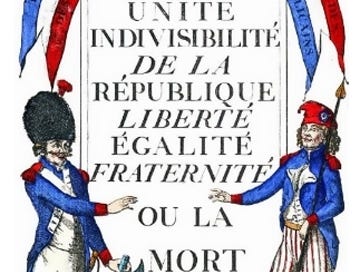Liberté, Egalité, Fraternité and Immigration

The words Liberté, Egalité, Fraternité were written into the 1958 French Constitution and are considered part of the French national heritage. This week France’s Constitutional Court ruled that the “principle of fraternity” protected farmer Cédric Herrou from prosecution for aiding dozens of migrants who had entered the country illegally. (Story here)
As we work on planning our move from North Vancouver to France, we necessarily are also looking at visas and immigration. I know too well that the reality of crossing a border is only known fully when you reach the boundary, and that the best laid plans can run afoul of unanticipated bureaucracy, but at this point it really does seem that France welcomes immigrants as long as they can support themselves.
This feels much different from Canada, a country which sells itself as being a welcoming place for refugees and immigrants while actually keeping the doors pretty firmly closed.
At the same time that France was enshrining protections for citizens who aid immigrants (legal or not), the Globe and Mail reported on Canada's appalling and labyrinthine visa system, which is refusing visas to a larger percentage of applicants every year. It has reached the point where these Harper era policies are blocking scholars trying to attend academic conferences, even when the Canadian government is paying them to attend.
From the Globe and Mail story by Geoffrey York and Michelle Zilio:
Last year alone, Canada refused entry to nearly 600,000 people who wanted to come for a short stay for tourism, school, business, academic conferences or simply to see their families. And the refusals have skyrocketed: The number has more than doubled since 2012, according to data obtained by The Globe and Mail.
and
The World Economic Forum, which conducts an annual study of travel and tourism competitiveness around the world, puts Canada’s visa requirements among the most complex and opaque in the world. In a 2017 survey that ranks 136 countries from best to worst when it comes to the difficulty of their visa rules, Canada placed a dismal 120th – a drop of 14 places from an earlier survey in 2013.
Where Canada is ranked 120th, France manages 73. (Also of interest is the "Health and Hygiene" index, which has France at 14th, and Canada at a dismal 59th, including 38th for "Access to Improved Drinking Water.")
What fascinates me, and gives me some sense of hope when I look at France, is how the latter reacts to the current political climate. Both countries have seen a rise in right-wing racism and xenophobia, with endless unfounded (yet well-reported) claims that immigrants are stealing our jobs, draining our resources, and causing an alarming jump in violent crime. In Canada it seems as if both the media and politicians have been drawn into this vortex, and are afraid to challenge the dishonesty and orthodoxy that it represents. In this country politicians of all stripes will chime in about the necessity to protect our borders, to justify the years it takes to examine even the most blatantly genuine of refugee claims, or to subtly acknowledge that Those People are not like Us.
I cannot recall the last time that I saw a Canadian politician actually stand up in support of increased immigration, with the exception of the Trudeau flash-in-the-pan that was Syrian refugees.
Aside from Marine Le Pen and the Rassemblement national (formerly known as the Front national) it feels as if the French body politic has maintained a much more humane and reasonable approach to those entering their country.
I quite think that I'll like living in a country whose courts decide that “the principle of fraternity confers the freedom to help others, for humanitarian purposes, regardless of the legality of their presence on national territory.”
Addendum: An interesting analysis on French attitudes towards immigration by Harvard University's Arthur Goldhammer.
The president’s room for maneuver is limited. He must fortify himself against Wauquiez’s Republicans and the Front National, who lie in wait for him on this issue. But he cannot afford to alienate the center-left support that put him in office, and for the center-left this is an issue where the heart tends to outweigh reason, not to say silence it. Striking the proper balance will likely prove to be the ultimate test of Macron’s political skills.





